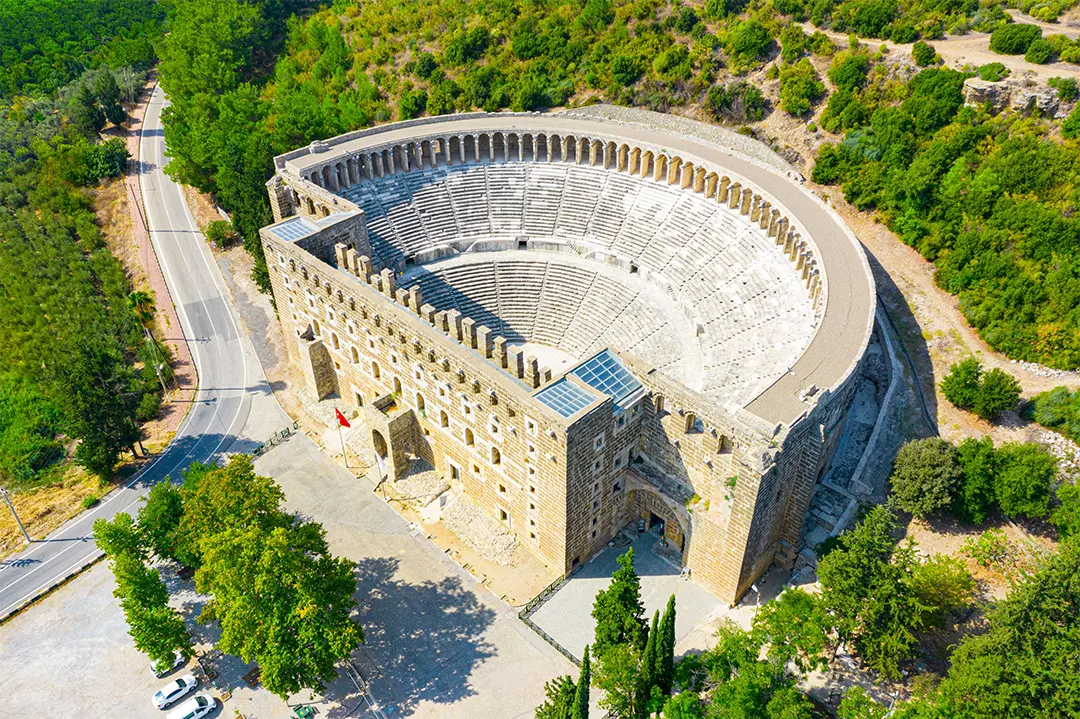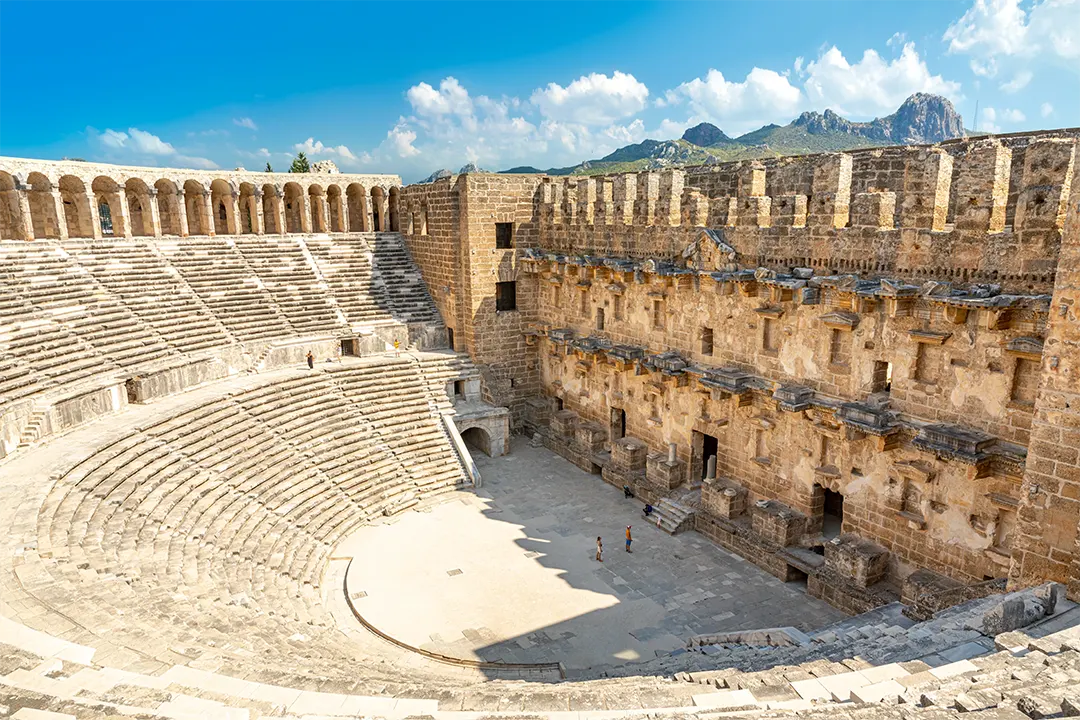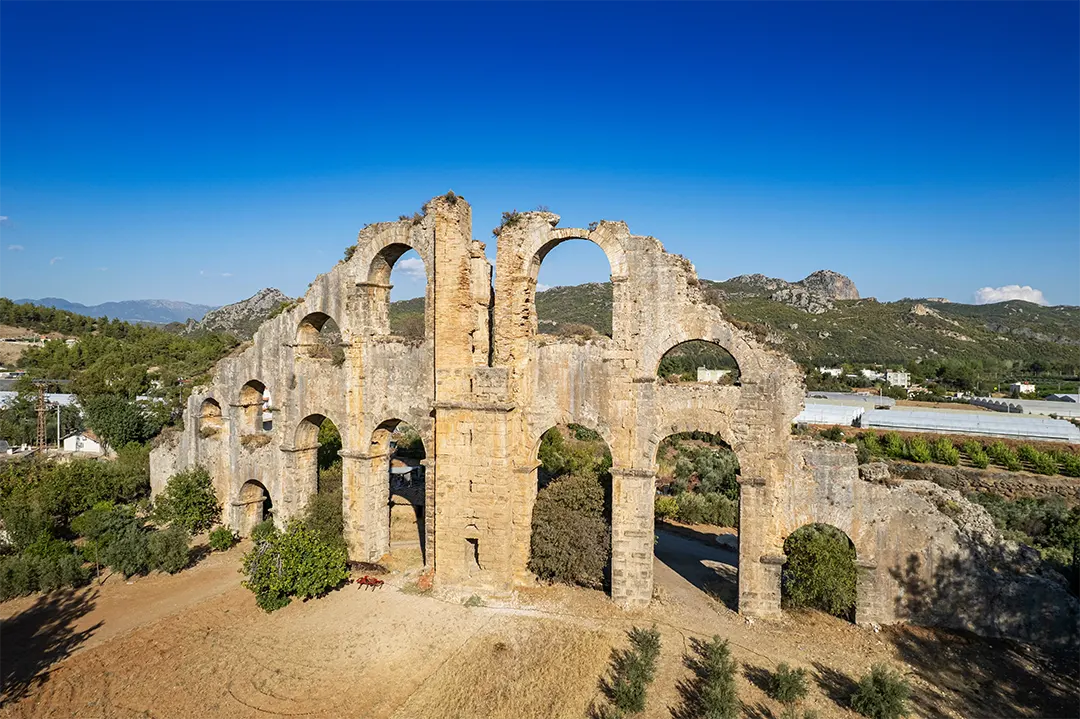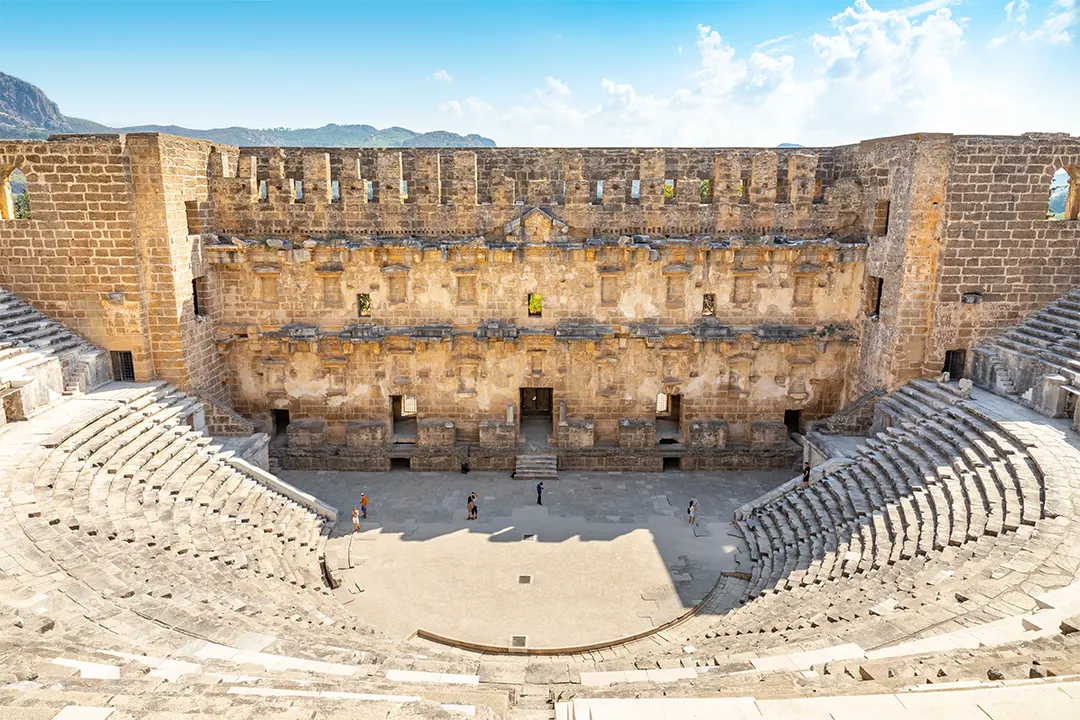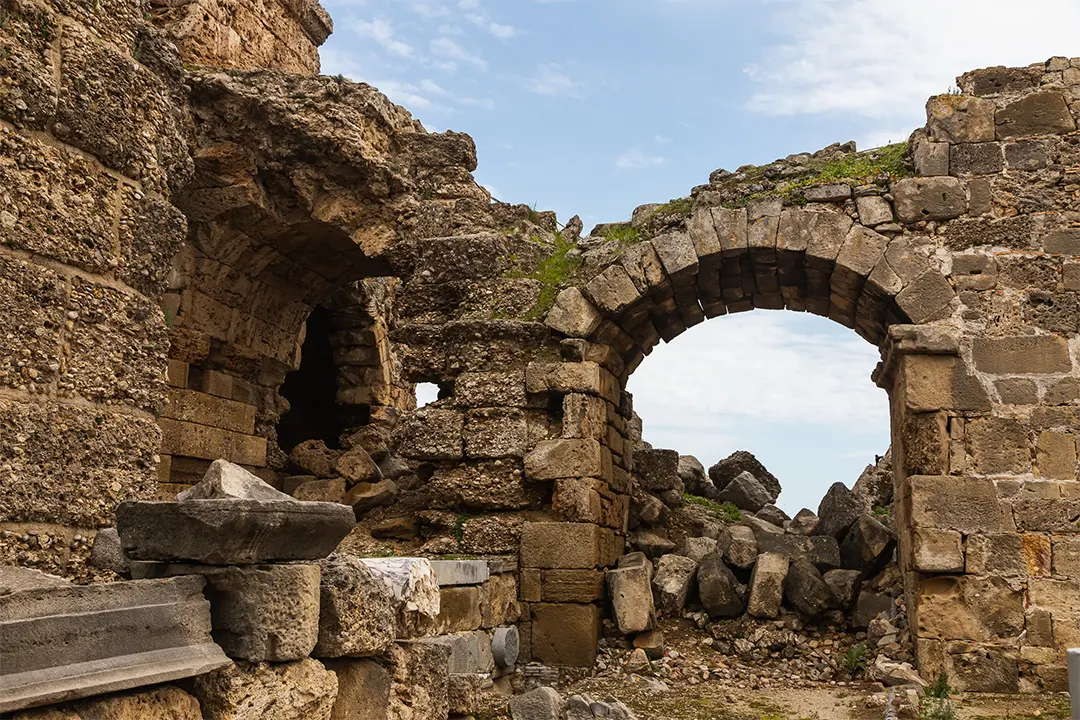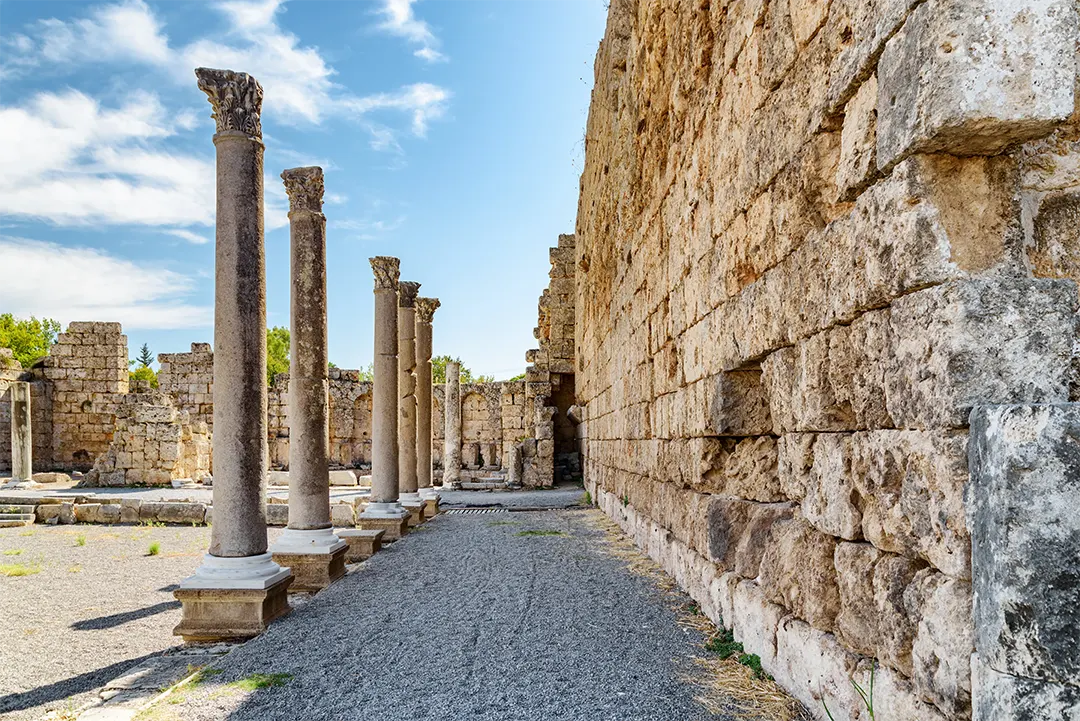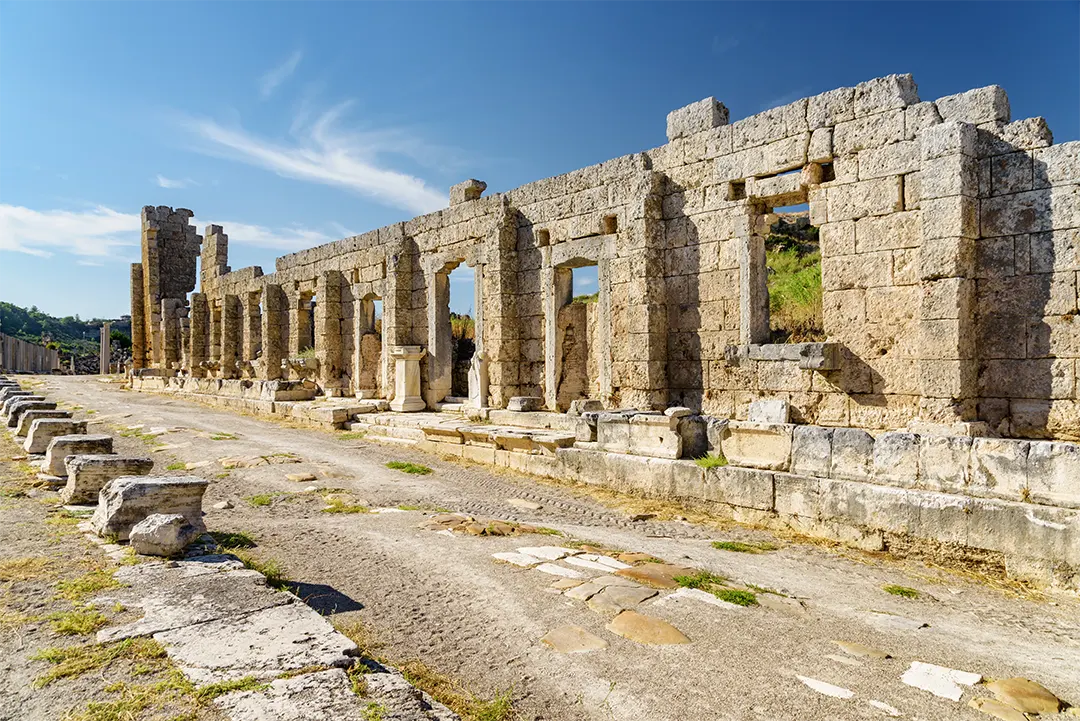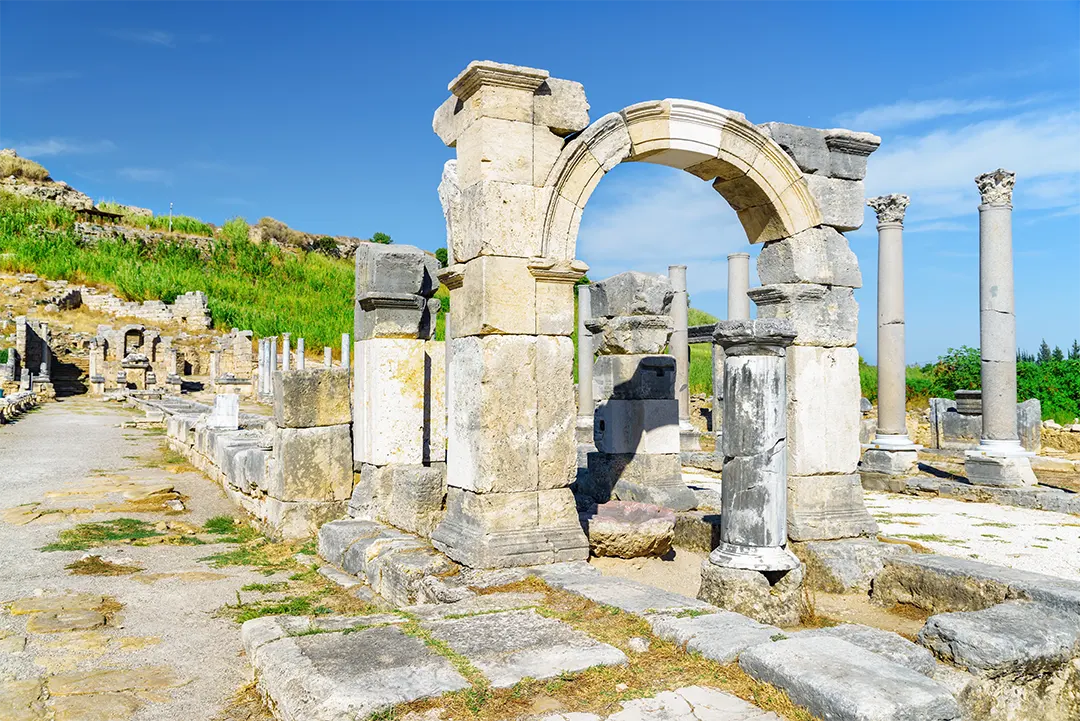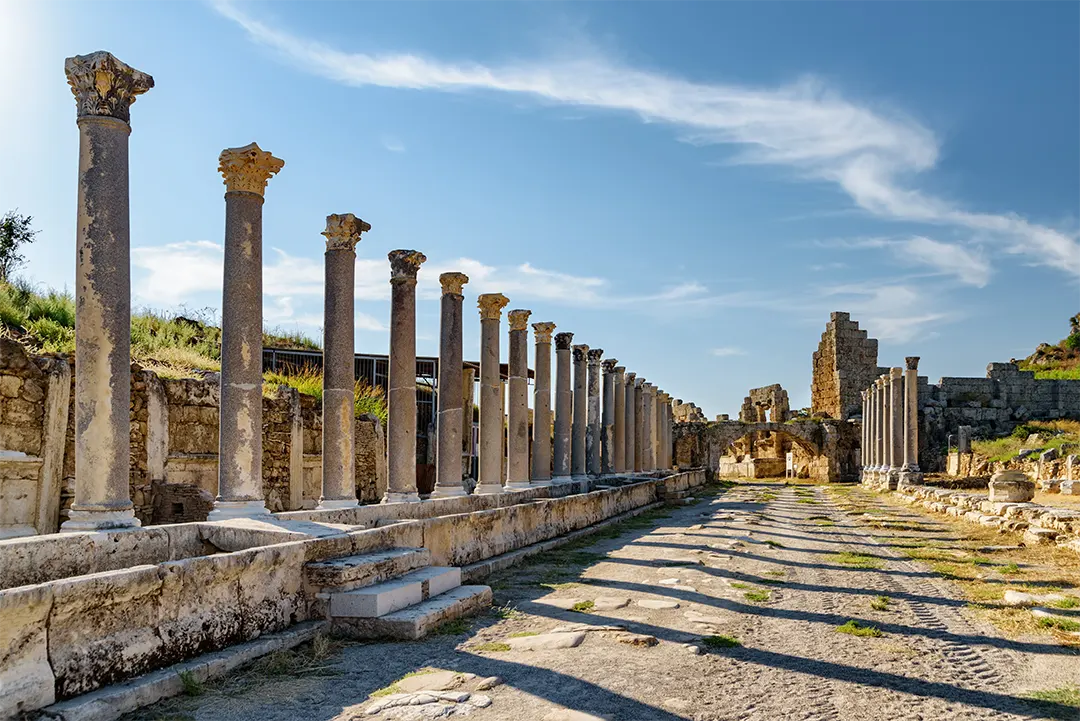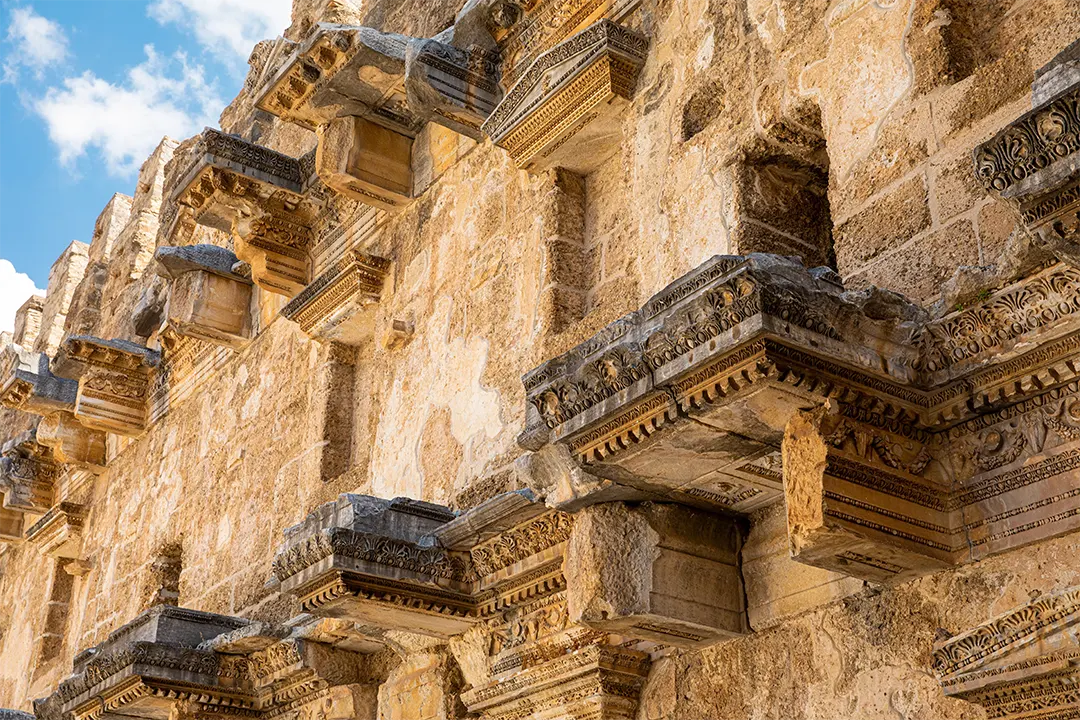Pick-up-9:30 Drop-off -17:30 (Approx)
LUNCH is included at a famous Turkish restaurant.
TOUR PROGRAMME:
- Departue from hotel
- Arriving at Perge Ancient Site
- Stadium, Roman Gate, Nymphaeum, Roman Bath,
- Hellenistic Gate, Colonnaded Street, Agora.
- Lunch on Euromedon River near Aspendos
- Ancient Theatre
- Aquaducts, Aspendos Ancient Theatre
- Shopping break
- Side, Apollo Temple
- Transfer to the hotel.
ASPENDOS:
Aspendos, located beside the river Eurymedon (Köprüçay), is renowned throughout the world for its magnificent ancient amphitheatre.
According to Greek legend, the city was founded by Argive colonists who, under the leadership of the hero Mopsos, came to Pamphylia after the Trojan War. Aspendos was one of the first cities in the region to strike coinage under its own name. On these silver staters dated to the fifth and fourth century B.C. however, the name of the city is written as Estwediys in the local script. A late eighth century B.C. bilingual inscription carved in both Hittite hieroglyphs and the Phoenician alphabet discovered in the 1947 excavation of Karatepe near Adana, states that Asitawada, the king of Danunum (Adana), founded a city called Azitawadda, a derivation of his own name, and that he was a member of the Muksas, or Mopsus, dynasty. The striking similarity between the names “Estwediiys” and “azitawaddi” suggests the possibility that Aspendos was the city this king founded.
In 467 B.C. the statesman and military commander Cimon, and his fleet of 200 ships, destroyed the Persian navy based at the mouth of the river Eurymedon in a surprise attack. In order to crush to Persian land forces, he tricked the Persians by sending his best fighters to shore wearing the garments of the hostages he had seized earlier. When they saw these men, the Persians thought that they were compatriots freed by the enemy and arranged festivities in celebration. Taking advantage of this, Cimon landed and annihilated the Persians. Aspendos then became a member of the AtticDelos Maritime league.
The Persians captured the city again in 411 B.C. and used it as a base. In 389 B.C. the commander of Athens, in an effort to regain some of the prestige that city had lost in the Peloponnesian Wars, anchored off the coast of Aspendos in an effort to secure its surrender. Hoping to avoid a new war, the people of Aspendos collected money among themselves and gave it to the commander, entreating him to retreat without causing any damage. Even though he took the money, he had his men trample all the crops in the fields. Enraged, the Aspendians stabbed and killed the Athenian commander in his tent.
When Alexander the Great marched into Aspendos in 333 B.C. after capturing Perge, the citizens sent envoys to him to request that he would not establish that he be given the taxes and horses that they had formerly paid as tribute to the Persian king. After reaching this agreement. Alexander went to Side, leaving a garrison there on the city’s surrender. Going back through Sillyon, he learned that the Aspendians had failed to ratify the agreement their envoys had proposed and were preparing to defend themselves. Alexander marched to the city immediately. When they saw Alexander returning with his troops, the Aspendians, who had retreated to their acropolis, again sent envoys to sue for peace. This time, however, they had to agree to very harsh terms; a Macedonian garrison would remain in the city and 100 gold talents as well as 4.000 horses would be given in tax annually.
PERGE:
Perge, one of Pamphylia’s foremost cities, was founded on a wide plain between two hills 4 km. west of the Kestros (Aksu) river.
Skylax, who lived in the fourth century B.C. and was the earliest of the ancient writers to mention Perge, states that the city was in Pamphylia. In the New Testament book, Acts of the Apostles, the sentence “...when Paul and his company loosed from Paphos, they came to Perge in Pamphylia” suggests that Perge could be reached from the sea in ancient times. Just as the Kestros provides convenient communication today, the diver also played an important role in antiquity, making the land productive, and securing for Perge the possibility of sea trade. Despite its being some 12 km. inland from the sea, Perge by means of the Kestros, was able to benefit from the advantages of the sea as if it was a coastal city. Moreover, it was removed from the attacks of pirates invading by sea.
In later copies of a third or fourth century map of the world, Perge is shown beside the principal road starting at Pergamum and ending at Side.
According to Strabo, the city was founded after the Trojan War by colonists from Argos under the leadership of heroes named Mopsos and Calchas. However the Hittite tablet found in Boğazköy mentions the name of the city as Parha,and judging from the name of a goddess on an ancient coin found there,the city has a very old history . Linguistic research confirms that Achaeans entered Pamphylia toward the end of the second millennium B.C. ın addition to these studies, inscriptions dating to 120-121 A.D., discovered in the 1953 excavations in the courtyard of Perge’s Hellenistic city gate, provide further testimony to this colonization; inscriptions on statue bases mention the names of seven heroes-Mopsos, Calchas, Riksos, Labos, Machaon, Leonteus, and Minyasas, the legendary founders of the city.
There is no further record of Perge in written sources until the middle of the fourth century. There can be no doubt, however, that Perge was also under Persian rule until the arrival of Alexander the Great.
SİDE:
Side, ancient Pamphylia’s largest port, is situated on a small peninsula extending north-south into the sea.
Strabo and Arrianos both record that Side was settled from Kyme, city in Aeolia, a region of western Anatolia. Most probably,this colonization occurred in the seventh century B.C. According to Arrianos, when settlers from Kyme came to Side, they could not understand the dialect. After a short while, the influence of this indigenous tongue was so great that the newcomers forgot their native Greek and started using the language of Side. Excavations have revealed several inscriptions written in this language. The inscriptions, dating from the third and second centuries B.C., remain undeciphered, but testify that the local language was still use several centuries after colonization. Another object found in Side excavations, a basalt column base from the seventh century B.C. and attributable to the Neo Hittites provides other evidence of the site’s early history. The word “side” is Anatolian in origin and means pomegranate.
Next to no information exists concerning Side under Lydian and Persian sovereignty. Nevertheless, the fact that Side minted its own coins during the fifth century B.C. while under Persian dominion, shows that it still possessed a great measure of independence.
In 333 A.D. despite its strong land and sea walls, Side surrendered to Alexander the Great without a fight. For a long period following the death of Alexander, Side came under the dominion of the Ptolemaic and Seleucid Empires, and in 190 B.C. witnessed a great naval battle. This encounter took place between the fleet of Rhodes, acting with the support of Rome and Pergamum, and the fleet of Antiochos III, the king of Syria, under the command of the famous Carthaginian Hannibal. Side took the side of Hannibal, but the Rhodian forces carried the day.




